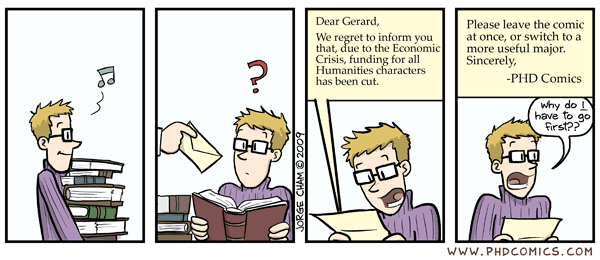Image: “Piled Higher and Deeper” by Jorge Cham / www.phdcomics.com
A new report published by the American Academy of Arts and Sciences belies the hackneyed stereotype of liberal arts students as a group destined to underemployment. The State of the Humanities 2018: Graduates in the workforce and beyond, found that graduates in humanities earn less and have a slightly higher unemployment rate for graduates in STEM fields. However, with regards to self-perception of their economic well being and job satisfaction, the results are very similar for graduates across all disciplines.
Overall, the median annual income for humanities graduates ($ 52,000) is lower than the average from all disciplines ($ 60,000 USD) and pales in comparison to the annual income of engineering graduates ($ 82,000 USD). However, education and specialization can increase these prospects; a postgraduate degree in the humanities can rise median annual income by 38% ($ 72,000 USD). That is five percentage points above the average of all fields. Also, the report also reveals that the wage gap between the humanities and other fields, such as business and engineering, is reduced over time.
As for unemployment, the rate for the humanities in the US is 4.3% and 3.6% for the rest of professionals. However, in both cases, these are the lowest unemployment rates since the Great Recession.
In general economic terms, only the arts and education are less “profitable” than the humanities. However, about 70% of graduates in this last group claim they are deeply interested in the work they do. Although the differences between these groups are small, in terms of job satisfaction, more humanists, especially those with MA or Ph.D., reported being satisfied than engineers and business people.
Perhaps the most interesting conclusion that can be drawn from the study is that, despite high job satisfaction in the humanities, there exists a disconnect between job requirements and graduates’ skills. About 70% humanists claim that, in their jobs, they have the opportunity to ‘do what they do best’ every day.
However, if broken down over time, there is a downward trend in this measure for all fields since the 60s. This decline has impacted the humanities more than any other group. Between 1960 and 1979, about 85% of graduates in humanistic disciplines were in jobs where they had the opportunity to do what they do best. Between 1980 and 1999, this figure dropped to 70%. For graduates between 2000 and 2014, the figure is about 60%.
Moreover, as the report points out, employers report on deficiencies in their workforce’s humanistic skills, such as writing and reading comprehension. The causes of this trend are open to speculation, but universities must rethink how they teach and assess the soft skills that are the hallmark of a humanistic education.
This article from Observatory of the Institute for the Future of Education may be shared under the terms of the license CC BY-NC-SA 4.0 
)
)


)